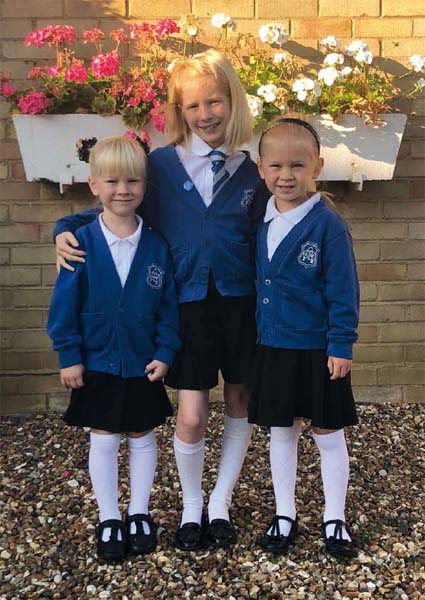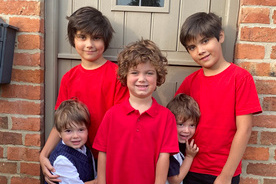18 September 2019
Whether you're punching the air or weeping into the sink, Twins Trust’s Head of Family Services, Louise Bowman, offers tips on a good start at school.
I wasn't prepared for the emotions I would feel when Scarlett and Connie started school last September.
Having an older daughter, Daisy, we weren't worried about it as we knew the school routine and knew they were ready. But I work part-time and for the past 10 years had always had someone to look after and do things with on my days off.
The thought of my girls starting school was exciting - finally I would get some time to myself. But on that first drop-off, walking home alone felt very strange, like I had entered the next stage of our lives.
But as well as feeling that my babies were growing up, I also felt pride that we had made it to five years with twins, and that they were ready for the next step.

After a couple of weeks, knowing they were settled and happy, I began to really enjoy the time I now have to myself. Sometimes when my husband has the day off too, we enjoy a breakfast date after the school drop-off.
The girls settled well into their new school life. But having multiples start school was different to my singleton, so I’d like to share some of my top tips…
Together or apart?
After reading documents on the Twins Trust website and speaking with the girls and their preschool, we decided to keep them together in the same class. Our decision was supported by the school.
When the teachers came to do the home visit we made sure we discussed each child individually, but we also dedicated some time to talking about their twin relationship, because that's important too. I gave the teachers Twins Trust's guide for teachers and the individuality factsheet, and discussed how important it was to treat them as Scarlett and Connie, and never “the twins”.
Parents evening
Ensure you get a separate appointment for each child. I have heard of some schools that offer one appointment for a set of twins - it would not happen with other siblings! With our school, we have an appointment for each of the girls and only talk about that child for the allocated time, but we also add a few extra minutes at the end to talk about their relationship, as it's just as important.
Friendships
Our girls took longer to make friends with other children than our older daughter did. To begin with they relied on each other as friends at playtime, but once they had settled they began to branch out and play with different people.
It is hard having playdates, but we have taken a few opportunities to have different children round to play. The girls have also been round to friends’ houses separately to play - Connie one week and Scarlett the next. This helped them understand they don't do everything together.
If one gets invited out to play but the other doesn't, it's best to embrace it rather than take it to heart. Use it as an opportunity to have some time with the child at home and do something special together.
Illness
I worried about one girl being ill and the other having to go to school on her own, but it was not as bad as I expected. The first time it happened, it was Connie who was poorly. Scarlett wasn't happy about going to school, but she did, and was praised for it and seemed to accept that sometimes it will happen. It underlined the importance of them not always having been together - even from a young age we would try to occasionally separate the girls, taking one out, in order to have one-on-one time.
Comparing
It is hard not to compare twins or triplets: same-age children doing the same thing at the same time. But it is important not to as they are still individuals.
It is important to recognise that children learn at different rates and in different styles. Instead of comparing them, I try to notice and comment on the progress they each make individually, and encourage them to say “I am good at…” In our family, Scarlett is on a higher reading level to Connie and is progressing well with phonics, while Connie struggles with forming some letters and has been refereed to our speech and language team. We do discuss this with the girls as Connie has some one-to-one time each day with a teaching assistant, but we never compare them with one another over their learning. There are things Connie finds easier too - she’s a fast runner and more confident speaking to people. It’s easy to fall into the trap of who is the clever twin, who is the mischievous one and so on, but if we resist that and set a good example then hopefully it can stop other people doing it too.
If your children are just about to start on this journey then do embrace it, but know that if there are hurdles along the way, Twins Trust is here to support you.
-strap.svg)



